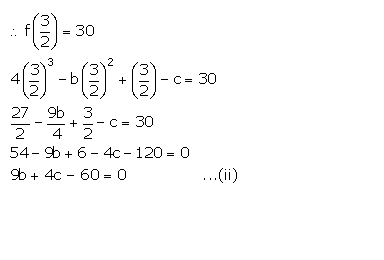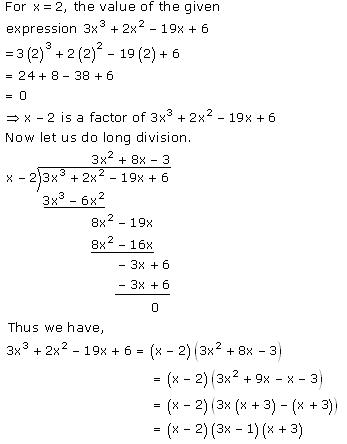Using the Factor Theorem, show that:
(i) (x - 2) is a factor of x3 - 2x2 - 9x + 18. Hence, factorise the expression x3 - 2x2 - 9x + 18 completely.
(ii) (x + 5) is a factor of 2x3 + 5x2 - 28x - 15. Hence, factorise the expression 2x3 + 5x2 - 28x - 15 completely.
(iii) (3x + 2) is a factor of 3x3 + 2x2 - 3x - 2. Hence, factorise the expression 3x3 + 2x2 - 3x - 2 completely.
(i) Let f(x) = x3 - 2x2 - 9x + 18
x - 2 = 0 ![]() x = 2
x = 2
![]() Remainder = f(2)
Remainder = f(2)
= (2)3 - 2(2)2 - 9(2) + 18
= 8 - 8 - 18 + 18
= 0
Hence, (x - 2) is a factor of f(x).
Now, we have:

![]() x3 - 2x2 - 9x + 18 = (x - 2) (x2 - 9) = (x - 2) (x + 3) (x - 3)
x3 - 2x2 - 9x + 18 = (x - 2) (x2 - 9) = (x - 2) (x + 3) (x - 3)
(ii) Let f(x) = 2x3 + 5x2 - 28x - 15
x + 5 = 0 ![]() x = -5
x = -5
![]() Remainder = f(-5)
Remainder = f(-5)
= 2(-5)3 + 5(-5)2 - 28(-5) - 15
= -250 + 125 + 140 - 15
= -265 + 265
= 0
Hence, (x + 5) is a factor of f(x).
Now, we have:

![]() 2x3 + 5x2 - 28x - 15 = (x + 5) (2x2 - 5x - 3)
2x3 + 5x2 - 28x - 15 = (x + 5) (2x2 - 5x - 3)
= (x + 5) [2x2 - 6x + x - 3]
= (x + 5) [2x(x - 3) + 1(x - 3)]
= (x + 5) (2x + 1) (x - 3)
(iii) Let f(x) = 3x3 + 2x2 - 3x - 2
3x + 2 = 0 ![]()

Hence, (3x + 2) is a factor of f(x).
Now, we have:

Using the Remainder Theorem, factorise each of the following completely.
(i) 3x3 + 2x2 − 19x + 6
(ii) 2x3 + x2 - 13x + 6
(iii) 3x3 + 2x2 - 23x - 30
(iv) 4x3 + 7x2 - 36x - 63
(v) x3 + x2 - 4x - 4
(i)
(ii) Let f(x) = 2x3 + x2 - 13x + 6
For x = 2,
f(x) = f(2) = 2(2)3 + (2)2 - 13(2) + 6 = 16 + 4 - 26 + 6 = 0
Hence, (x - 2) is a factor of f(x).

(iii) f(x) = 3x3 + 2x2 - 23x - 30
For x = -2,
f(x) = f(-2) = 3(-2)3 + 2(-2)2 - 23(-2) - 30
= -24 + 8 + 46 - 30 = -54 + 54 = 0
Hence, (x + 2) is a factor of f(x).

(iv) f(x) = 4x3 + 7x2 - 36x - 63
For x = 3,
f(x) = f(3) = 4(3)3 + 7(3)2 - 36(3) - 63
= 108 + 63 - 108 - 63 = 0
Hence, (x + 3) is a factor of f(x).

(v) f(x) = x3 + x2 - 4x - 4
For x = -1,
f(x) = f(-1) = (-1)3 + (-1)2 - 4(-1) - 4
= -1 + 1 + 4 - 4 = 0
Hence, (x + 1) is a factor of f(x).

Using the Remainder Theorem, factorise the expression 3x3 + 10x2 + x - 6. Hence, solve the equation 3x3 + 10x2 + x - 6 = 0.
Let f(x) = 3x3 + 10x2 + x - 6
For x = -1,
f(x) = f(-1) = 3(-1)3 + 10(-1)2 + (-1) - 6 = -3 + 10 - 1 - 6 = 0
Hence, (x + 1) is a factor of f(x).

Now, 3x3 + 10x2 + x - 6 = 0

Factorise the expression f (x) = 2x3 - 7x2 - 3x + 18. Hence, find all possible values of x for which f(x) = 0.
f (x) = 2x3 - 7x2 - 3x + 18
For x = 2,
f(x) = f(2) = 2(2)3 - 7(2)2 - 3(2) + 18
= 16 - 28 - 6 + 18 = 0
Hence, (x - 2) is a factor of f(x).

Given that x - 2 and x + 1 are factors of f(x) = x3 + 3x2 + ax + b; calculate the values of a and b. Hence, find all the factors of f(x).
f(x) = x3 + 3x2 + ax + b
Since, (x - 2) is a factor of f(x), f(2) = 0
![]() (2)3 + 3(2)2 + a(2) + b = 0
(2)3 + 3(2)2 + a(2) + b = 0
![]() 8 + 12 + 2a + b = 0
8 + 12 + 2a + b = 0
![]() 2a + b + 20 = 0 ...(i)
2a + b + 20 = 0 ...(i)
Since, (x + 1) is a factor of f(x), f(-1) = 0
![]() (-1)3 + 3(-1)2 + a(-1) + b = 0
(-1)3 + 3(-1)2 + a(-1) + b = 0
![]() -1 + 3 - a + b = 0
-1 + 3 - a + b = 0
![]() -a + b + 2 = 0 ...(ii)
-a + b + 2 = 0 ...(ii)
Subtracting (ii) from (i), we get,
3a + 18 = 0
![]() a = -6
a = -6
Substituting the value of a in (ii), we get,
b = a - 2 = -6 - 2 = -8
![]() f(x) = x3 + 3x2 - 6x - 8
f(x) = x3 + 3x2 - 6x - 8
Now, for x = -1,
f(x) = f(-1) = (-1)3 + 3(-1)2 - 6(-1) - 8 = -1 + 3 + 6 - 8 = 0
Hence, (x + 1) is a factor of f(x).

The expression 4x3 - bx2 + x - c leaves remainders 0 and 30 when divided by x + 1 and 2x - 3 respectively. Calculate the values of b and c. Hence, factorise the expression completely.
Let f(x) = 4x3 - bx2 + x - c
It is given that when f(x) is divided by (x + 1), the remainder is 0.
![]() f(-1) = 0
f(-1) = 0
4(-1)3 - b(-1)2 + (-1) - c = 0
-4 - b - 1 - c = 0
b + c + 5 = 0 ...(i)
It is given that when f(x) is divided by (2x - 3), the remainder is 30.

Multiplying (i) by 4 and subtracting it from (ii), we get,
5b + 40 = 0
b = -8
Substituting the value of b in (i), we get,
c = -5 + 8 = 3
Therefore, f(x) = 4x3 + 8x2 + x - 3
Now, for x = -1, we get,
f(x) = f(-1) = 4(-1)3 + 8(-1)2 + (-1) - 3 = -4 + 8 - 1 - 3 = 0
Hence, (x + 1) is a factor of f(x).

If x + a is a common factor of expressions f(x) = x2 + px + q and g(x) = x2 + mx + n; show that: ![]()
f(x) = x2 + px + q
It is given that (x + a) is a factor of f(x).

g(x) = x2 + mx + n
It is given that (x + a) is a factor of g(x).

From (i) and (ii), we get,
pa - q = ma - n
n - q = a(m - p)
![]()
The polynomials ax3 + 3x2 - 3 and 2x3 - 5x + a, when divided by x - 4, leave the same remainder in each case. Find the value of a.
Let f(x) = ax3 + 3x2 - 3
When f(x) is divided by (x - 4), remainder = f(4)
f(4) = a(4)3 + 3(4)2 - 3 = 64a + 45
Let g(x) = 2x3 - 5x + a
When g(x) is divided by (x - 4), remainder = g(4)
g(4) = 2(4)3 - 5(4) + a = a + 108
It is given that f(4) = g(4)
64a + 45 = a + 108
63a = 63
a = 1
Find the value of 'a', if (x - a) is a factor of x3 - ax2 + x + 2.
Let f(x) = x3 - ax2 + x + 2
It is given that (x - a) is a factor of f(x).
![]() Remainder = f(a) = 0
Remainder = f(a) = 0
a3 - a3 + a + 2 = 0
a + 2 = 0
a = -2
Find the number that must be subtracted from the polynomial 3y3 + y2 - 22y + 15, so that the resulting polynomial is completely divisible by y + 3.
Let the number to be subtracted from the given polynomial be k.
Let f(y) = 3y3 + y2 - 22y + 15 - k
It is given that f(y) is divisible by (y + 3).
![]() Remainder = f(-3) = 0
Remainder = f(-3) = 0
3(-3)3 + (-3)2 - 22(-3) + 15 - k = 0
-81 + 9 + 66 + 15 - k = 0
9 - k = 0
k = 9

No comments:
Post a Comment